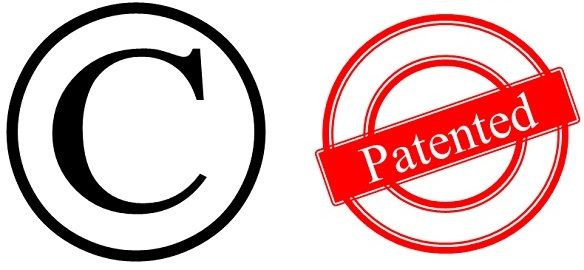 Intellectual property refers to the human creations, in which a person uses his/her brain, labour and capital. Copyrights and Patents are two rights that provide protection to Intellectual Property. These are the intangible assets which a company owns and has some economic value.
Intellectual property refers to the human creations, in which a person uses his/her brain, labour and capital. Copyrights and Patents are two rights that provide protection to Intellectual Property. These are the intangible assets which a company owns and has some economic value.
While copyright protects creative and intellectual works, which covers artistic, literary, musical and dramatic work. It is used to differentiate various classes of work. On the other hand, a patent protects new inventions from being used or produced by others such as solar panels, engines, batteries, etc. In this article, you can find the difference between copyright and patent.
Content: Copyright Vs Patent
Comparison Chart
| Basis for Comparison | Copyright | Patent |
|---|---|---|
| Meaning | Copyright means a form of protection conferred to the creator of original work, which excludes others from performing, selling or using the work. | Patent means the proprietory rights endowed to the inventor which excludes others from making, utilizing or trading the invention for a set period. |
| Subject matter | Expression | Ideas |
| Governing Act | Indian Copyright Act, 1957 | Indian Patent Act, 2005 |
| Covers | Artistic and literary works | Inventions |
| Registration | Automatic, no formality is required. | Registration is required. |
| Excludes | Others from copying or trading the product. | Others from manufacturing or using the product. |
| Term | 60 years | 20 years |
Definition of Copyright
By the term copyright, we mean a restricted and assignable right endowed to the originator of the artistic, musical, dramatic and literary work, as per law, for a definite number of years. As the name suggest, it protects the rights of the creators of original work, thus, providing ownership, safeguarding and honouring creativity. The rights includes:
- To reproduce the work.
- To communicate the creation to general public.
- To make a cinematographic film, on the creation.
- To make an adaptation of work.
- To issue copies of work to the public.
Further, copyright is acquired automatically, just after the work is created and therefore no registration is needed as such. But, in the case of regarding any legal dispute, on the authorship, the registration certificate is required to serve as evidence, before the court.
Copyright is granted for a term of 60 years, i.e. when the work is related to music, literature, art, drama, etc. , the period will be the life of the author plus 60 years. However, in the case of cinematographic films, recordings, publications, photographs and works of government and international organisations, the period of 60 years will be counted from the date of publication.
Definition of Patent
The patent is defined as the exclusive right or authority conferred to the inventor for a novel, and non-obvious invention, by the government for a fixed period, in exchange for a complete declaration of the invention. The inventor has the right to debar others from using, manufacturing, selling that invention, for a particular period. To get patented the invention should satisfy the following:
- It must be new and original.
- An inventive step must be there.
- It must be capable of industrial application.
The patent is awarded for twenty years, from the date of application, for which a renewal fee is required to be paid every year, to keep the patent valid for twenty years. Further, if the fee is not paid within the stipulated time, the rights will be ceased.
Key Differences Between Copyright and Patent
The following points are significant so far as the difference between copyright and patent is concerned:
- A bundle of rights granted to the creator of original work, which excludes others from performing, selling or producing the work, is known as Copyright. A legal grant given by the government to the inventor which excludes others from making, utilising or trading the invention for a set period, is called a patent.
- While idea, reduced to practice is the subject matter of the patent, copyright focuses on expression.
- In India, the Indian Copyright Act, 1957 regulates the copyright rules and regulations. On the contrary, patents are governed by the Indian Patent Act, 2005.
- Copyright includes artistic, and literary creation whereas patents stresses on inventions.
- As soon as the original work is created the copyright comes into existence, thus the protection is automatic, and no formality is required to be fulfilled. On the other hand, the patent requires registration, wherein the application of the patent is submitted at the regional or national patent organisation.
- Copyright excludes others from creating, copying or selling the original work. As against this, patent debars others from manufacturing or using the product or technique.
- Copyright, in general, is granted for 60 years. Unlike a patent, which is conferred to the author for 20 years.
Conclusion
Therefore, after the detailed discussion of the two subjects, you might have understood that both are the intellectual property right protection. Both are granted by the government but covers different aspects, i.e. copyright takes into account the creative and original work of the authors, whereas a patent is for new inventions or techniques/methods discovered.






Leave a Reply